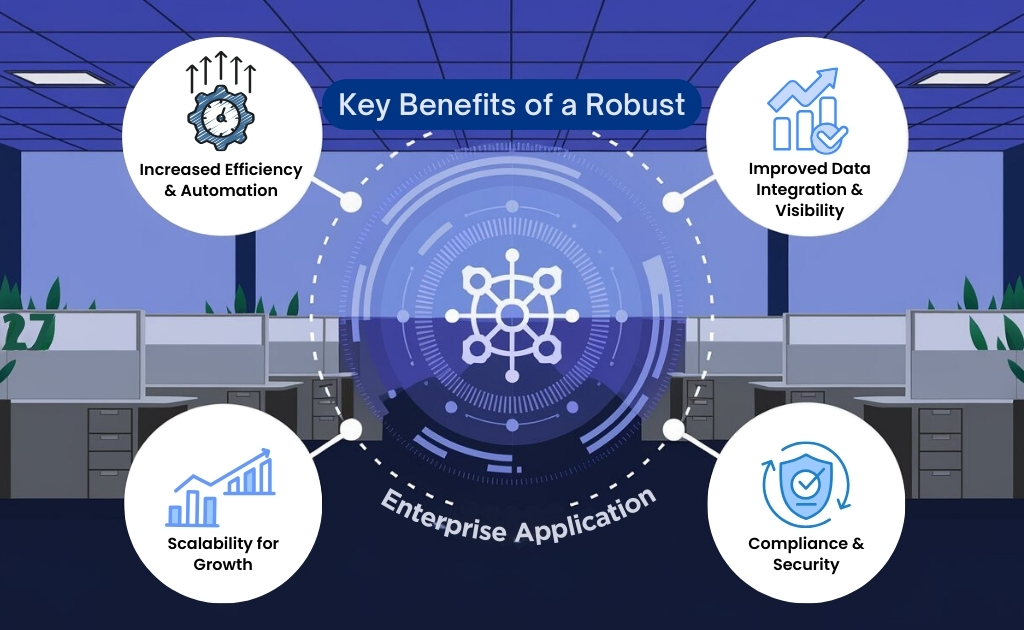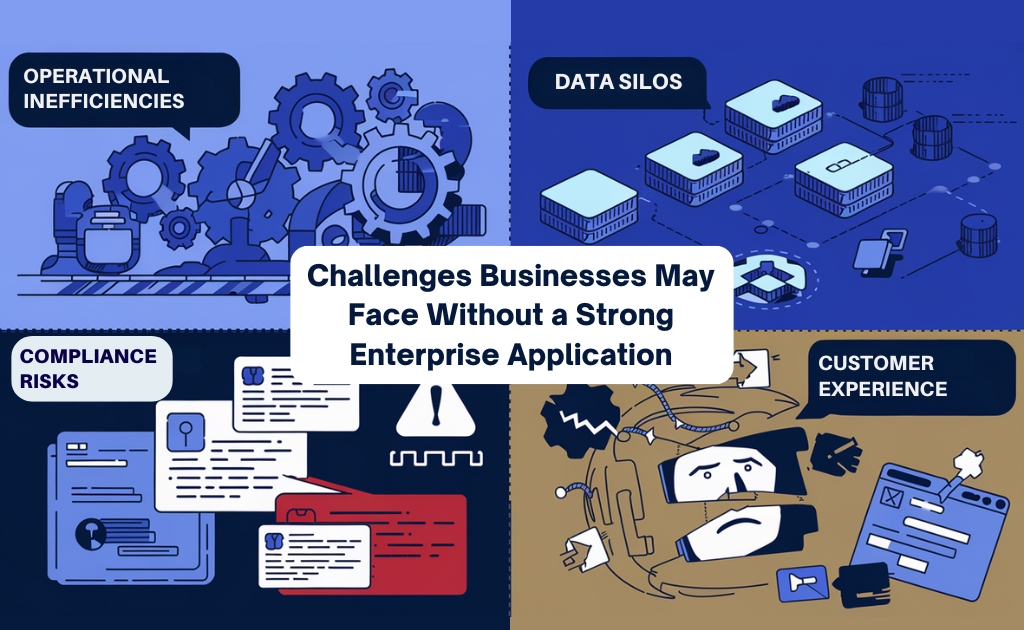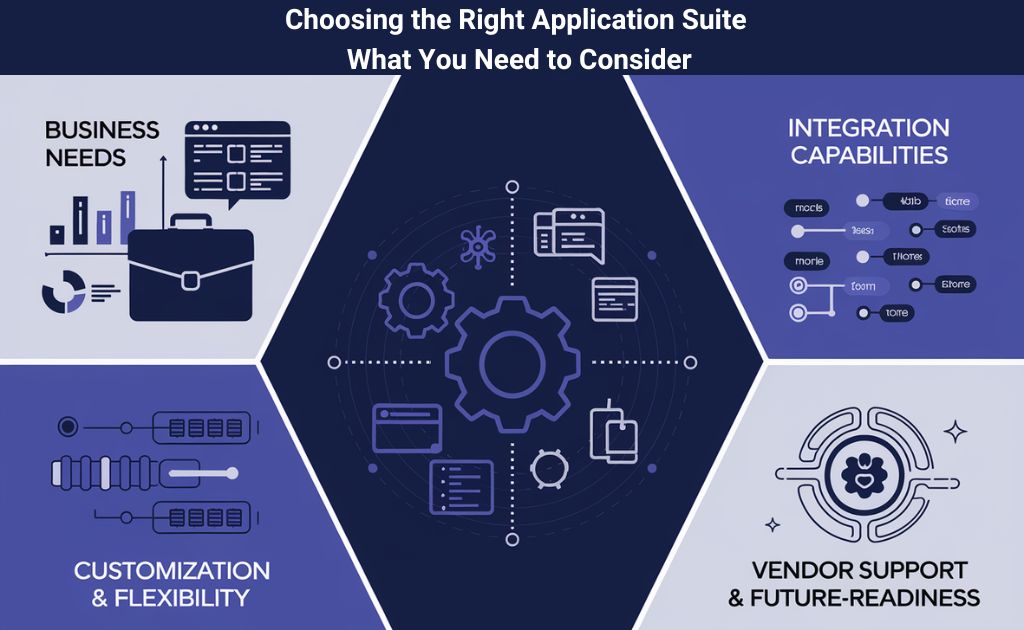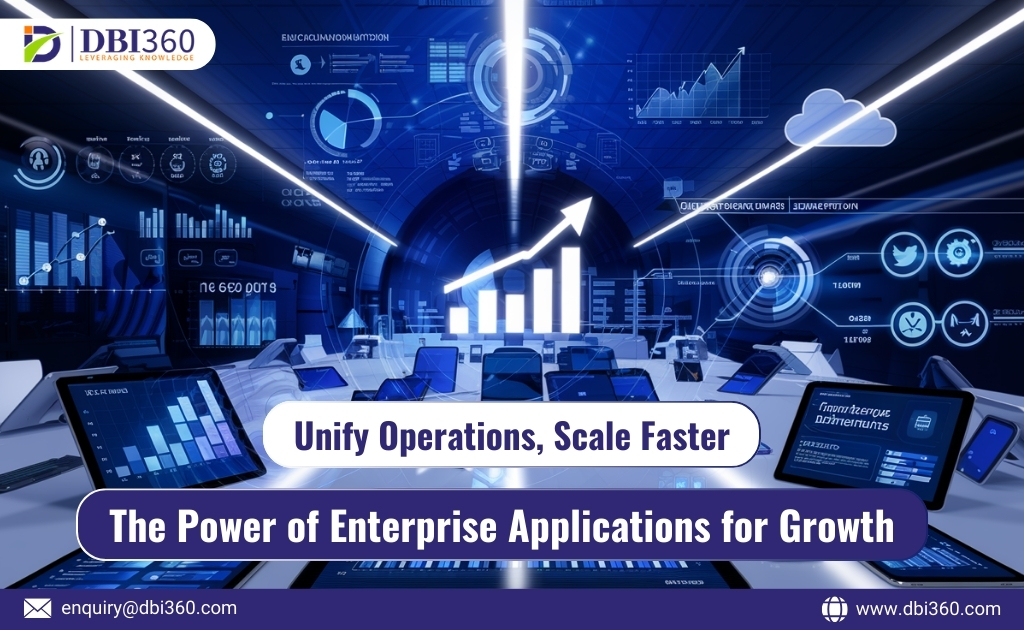In a world where business operations are becoming increasingly complex, relying on fragmented systems can cost your company time, money, and efficiency. For businesses looking to scale, it’s essential to invest in enterprise applications that integrate different aspects of your organization into one seamless system.
But what exactly are enterprise application software, and why are they crucial for businesses? Let’s dive deeper into how a robust application suite can help your growing business thrive.
What Are Enterprise Applications?
Enterprise applications refer to comprehensive software systems designed to serve the entire organization. Unlike standalone tools, enterprise applications integrate various business functions—such as finance, HR, operations, marketing, and sales—into a single, cohesive system.
Here are some of the key areas covered by enterprise applications:
- Enterprise Resource Planning (ERP): Manages day-to-day business activities such as accounting, procurement, and project management.
- Customer Relationship Management (CRM): Tracks interactions with customers, manages sales pipelines, and enhances customer service.
- Supply Chain Management (SCM): Ensures smooth procurement, inventory management, and product distribution.
- Human Resource Management (HRMS): Handles recruitment, attendance, payroll, and performance evaluations.
By integrating all these functions, enterprise applications create a unified view of your business, providing access to real-time data and improving decision-making.
Key Benefits of a Robust Enterprise Application Suite
Implementing an enterprise application suite brings a range of benefits that can transform how your business operates. Here’s how:
- Increased Efficiency & Automation: Enterprise applications automate routine tasks, allowing your employees to focus on strategic initiatives. Whether it’s approving purchase orders, processing payroll, or managing customer support tickets, automation reduces human errors and speeds up workflows.
- Improved Data Integration & Visibility: With enterprise applications, data from different departments is integrated into one system, breaking down silos. This means that your finance team can access sales forecasts, or HR can see productivity metrics—all in one place.
- Scalability for Growth: As your business grows, so do its operational needs. Enterprise applications are designed to scale with your business, allowing you to add new functionalities and users without disrupting your current processes.
- Compliance & Security: In an age where data breaches and regulatory changes are constant threats, enterprise applications offer advanced security features and ensure compliance with industry standards.

The Role of Enterprise Application Integration Software
Enterprise applications work best when they’re seamlessly integrated. This is where enterprise application integration software comes into play. It ensures that different systems communicate efficiently, sharing data across platforms and departments.
Here’s how integration software benefits your business:
- Enhanced Workflow Efficiency: By connecting previously siloed systems, integration software streamlines workflows. For instance, when a sales order is created in CRM, the finance team can immediately see it in the ERP, reducing communication delays.
- Consistent Data Across Systems: When systems aren’t integrated, manual data entry leads to inconsistencies. Integration software ensures that the data entered once is shared across all systems, avoiding errors and duplication.
- Real-Time Data Synchronization: Integration software updates data in real-time, ensuring that every department works with the most current information available. This is particularly crucial in industries like retail or manufacturing, where stock levels and customer orders can change rapidly.
Challenges Growing Businesses Face Without a Robust Enterprise Application Suite
Running a business without an integrated enterprise application suite can lead to several operational challenges, especially as you scale.
- Operational Inefficiencies: Without automation, manual processes become slow and error-prone. This can lead to missed opportunities, delayed decision-making, and frustrated employees.
- Data Silos: In organizations where different departments use separate systems, valuable data can get trapped in silos. For example, the sales team might have important customer information in a CRM, but the operations team might not have access to that data in real-time.
- Compliance Risks: Businesses that don’t have a unified system can struggle to meet regulatory requirements. Outdated or inaccurate records can lead to non-compliance, fines, and reputational damage.
- Customer Experience: When information is scattered across multiple systems, customer service suffers. Delays in retrieving customer information can lead to missed sales opportunities and a poor customer experience.

How to Choose the Right Enterprise Application Suite
Choosing the right enterprise application suite can make all the difference in your company’s growth journey. Here’s what to consider:
- Business Needs: Every business has unique challenges. Assess your company’s specific pain points—whether it’s automating manual tasks, improving collaboration between teams, or ensuring data security—and choose an enterprise application that addresses those needs.
- Integration Capabilities: Make sure your enterprise application suite includes strong enterprise application integration software. It should integrate seamlessly with other tools you’re already using, such as CRM, ERP, marketing, or accounting software.
- Customization & Flexibility: Look for a solution that can be tailored to your industry’s unique requirements. Whether it’s adding custom reports or integrating with niche tools, flexibility is key.
- Vendor Support & Future-Readiness: The vendor you choose should offer strong customer support and a clear roadmap for future updates. As your business evolves, the enterprise application suite should evolve with it, offering new features and enhancements.

Conclusion
As businesses grow, the complexity of operations also grows. Robust enterprise applications offer an integrated, scalable solution that not only boosts efficiency but also ensures data consistency, compliance, and better decision-making. By choosing the right enterprise application integration software, businesses can streamline operations and focus on what truly matters—growth and success.
DBI360 SSO offers a unified platform to manage and scale every aspect of your business, driving growth and operational efficiency. From compliance to sales, we’ve got you covered:
- AsterDocs: Your go-to compliance management solution for handling all critical documentation and regulatory requirements.
- GoMeet AI: Streamline your sales with AI-powered prospecting, meeting scheduling, and engagement.
- Nexus & Find Suppliers AI: Take control of your supply chain management and data management for smarter decision-making.
- ConfluxHR: Optimize HR operations, from payroll to performance reviews, with a seamless and efficient system.
- BuyersFlow: Supercharge your marketing automation and email campaigns to reach the right audience at the right time.

